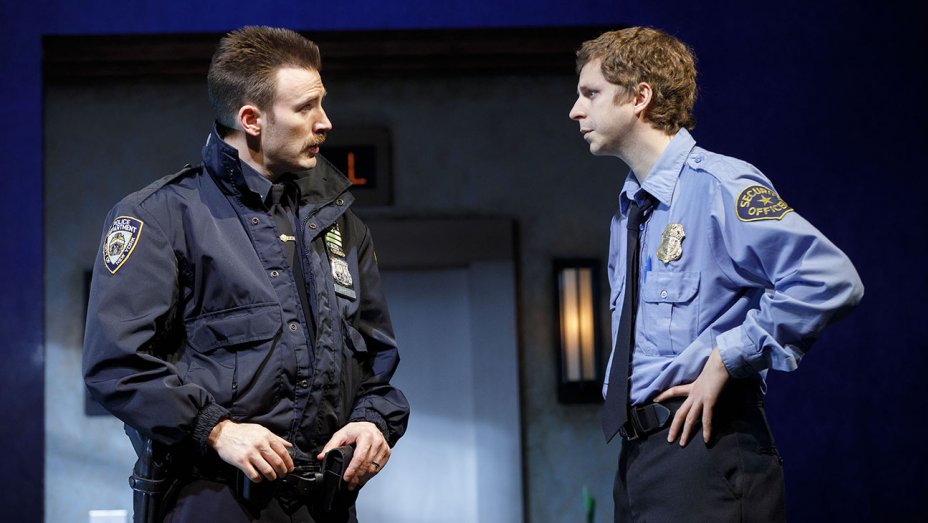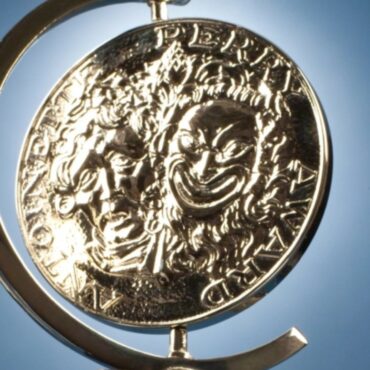chevron_left
-
play_arrow
NGradio So good... like you
share
close
Chris Evans makes his Broadway debut alongside Michael Cera, Brian Tyree Henry and Bel Powley in Oscar winner Kenneth Lonergan’s examination of moral conflict built around a murder investigation.
Let’s get the obvious question out of the way up front: Does Chris Evans cut it in his leap from the superhero universe to the naturalistic comedy-drama of Kenneth Lonergan’s Lobby Hero? Absolutely. Evans fully inhabits his character of a vain but well-liked New York City career cop on track to make detective, who is quite comfortable rationalizing to himself abuses of power large and small in a profession where gender inequality and toxic masculinity come with the badge. The actor best known as Captain America brings plenty of cocky swagger, his thumbs hooked into his utility belt like an Old West cowboy with a bushy mustache to match, but his assured performance never aims to be a star turn. Rather, it’s an integral part of an evenly balanced, four-person ensemble piece.
Nor is Lonergan’s play, first produced in 2001, strictly a hot-button work ahead of the curve in exploring imbalances of power that have become such a pressing part of the national conversation in the era of #MeToo, Time’s Up and Black Lives Matter. As we’ve come to expect from this thoughtful, compassionate writer — an Oscar winner last year for his screenplay for the symphonic domestic drama Manchester by the Sea — Lobby Hero is a textured consideration of more or less honest characters dealing with sticky moral questions, its dramatic pulse and its needling humor underscored by a rich vein of melancholy.
The second of Lonergan’s plays to come to Broadway following This Is Our Youth in 2014, this is in many ways a minor-key work for theatrical primetime, even if it’s been given a very fine production — with strong casting, sensitive direction from Trip Cullman and dynamic physical design by David Rockwell, who breathes movement and dimension into the single setting. But the intimate scale of the play also makes it an ideal choice to launch the inaugural Broadway season of Second Stage Theater, a leading off-Broadway company founded in 1979, now following other New York nonprofits into the big leagues. Second Stage’s mandate is to make its newly renovated Hayes Theater a permanent space on Broadway for the generally under-represented work of living American dramatists, including both revivals and new plays, some of them commissions. Lobby Hero marks an auspicious start to that mission.
The pivotal character, onstage the entire time, is Jeff (Michael Cera), a night-shift security guard in a Manhattan apartment building in 1999. He’s what a less subtle writer might ungenerously categorize as a “loser.” In Lonergan’s hands, however, he’s a slacker with lazy aspirations, not immune to feelings of envy toward the easy confidence and entitlement of Evans’ Bill, even if he’s intelligent and decent enough to bristle at those very qualities that seemingly enable the cop to get whatever he wants.

It takes some adjustment to accept baby-faced Cera as a guy who spent three years in the Navy before being kicked out for smoking weed and then hitting a rough patch exacerbated by gambling debts. But the actor has a history with Lonergan, having performed in This Is Our Youth in Sydney, Chicago and New York. He understands the playwright’s language, bringing nervous physical comedy, sputtering verbal eruptions and unexpected jolts of forthrightness to a character with more depth than his surface air of under-motivated self-deprecation might suggest.Jeff’s sense of inadequacy was fueled by the refusal of his father, a Navy hero, to speak to him after his disgrace, and his pique is freshened by Bill’s attitude toward him, which goes from offhand to patronizing to hostile.Jeff’s boss, supervising the graveyard shift as a stepping-stone to a management job, is William, played by the terrific Brian Tyree Henry in the production’s standout performance, showing a radically different range from his streetwise looseness on FX’s Atlanta. While he’s funny in his motormouth assessments of Jeff’s shortcomings, there are also warm, avuncular shadings in his efforts to help the younger subordinate improve himself. William is an African-American family man who takes his responsibilities very seriously and has minimal time for those who don’t. He prides himself on his integrity. But he’s put in an awkward position when his deadbeat brother is implicated in a violent crime of which he may or may not be innocent, and asks William to corroborate a false alibi.Lonergan makes sharp points about the way uniforms inflate authority. Jeff is forever pointing out that he’s a “security officer,” not a doorman, though that’s still basically a neutered cop, while on the police force a vast chasm exists between a seasoned officer and a rookie. That latter faction is represented by Bill’s young partner Dawn (Bel Powley), a newbie fresh out of the academy who has already made the mistake of falling for Bill’s considerable charms and sleeping with him. That makes her the subject of demeaning talk at the precinct. Bill also has something over her when she uses excessive force to break up a drunken brawl and he offers to back her up in his report at the inevitable inquiry.
These are four distinctively drawn characters, and their exchanges all ping with the electricity of people testing one another’s limits while trying to bump up their own place in the food chain. Bill is almost endearing as he puffs himself up for doe-eyed, adoring Dawn by making light of his “Supercop” reputation among the guys, while obviously buying into it 100 percent. But Jeff, who has a thing for women in uniform and takes all of five minutes to blurt out that he’s in love with Dawn, shatters her rose-tinted glasses when he reveals that married Bill is paying regular visits while on duty to a woman in an apartment upstairs known for spreading around her affections. That earns Jeff Bill’s enmity while leaving Dawn humiliated and angry.
Cullman’s staging nimbly dances around the characters’ shifting attitudes toward one another as Rockwell’s clever set — a realistic representation of the lobby minus the walls, with a main entrance, a security desk, elevator doors and street lamps outside — revolves back and forth to redirect our focus.

From left, Bel Powley, Michael Cera and Chris Evans in Lobby HeroLonergan has a talent for digging beneath the skin of his characters to examine what drives their behavior and especially what nudges them to make bad decisions, usually without much forethought and sometimes even with what they believe are good intentions. That’s notably the case with William, whose awareness of the odds stacked against black men and the racial bias in the justice system, not to mention the burden of family expectations, compel him to act against his instincts. Exposure to his brother’s sloppy court-appointed lawyer only strengthens his resolve. But he makes a mistake taking Jeff into his confidence. As more graphic details of the crime being investigated come to light, that puts Jeff, and in turn, Dawn in a position to use the information to their advantage.Powley’s character up to that point has seemed a naive kid trying to act tougher than she is (hence the braying Noo Yawk accent), and like Jeff, she’s resentful of a hyper-critical parent — in her case, her mother. But a fire ignites in her when she sees a way to seize control of a compromising situation, even if someone she’s starting to care for gets hurt in the process.The playwright’s hand isn’t always invisible in drawing the parallel relationships and then fracturing them with betrayals of trust. But what makes Lobby Hero so engrossing is that nobody is entirely right or wrong and the moral questions at stake are never simply black or white. Even narcissistic Bill, the shadiest of them, seems to believe he’s looking out for William when he’s also nurturing his own career prospects, though the pivot from a semblance of mentorship to intimidation and coercion when Dawn stands up to him reveals a sleazy core. The relative powerlessness of both Jeff and Dawn influences their actions, which means there’s a self-serving aspect alongside the more nebulous desire to make a difference.
It’s Lonergan’s clear-eyed yet forgiving view of human nature — despite its wide spectrum of imperfections — that makes his writing so rewarding and such a gift for good actors.
Written by: New Generation Radio
Rate it
Similar posts
ΔΗΜΟΦΙΛΗ ΑΡΘΡΑ
COPYRIGHT 2020. NGRADIO





















Post comments (0)